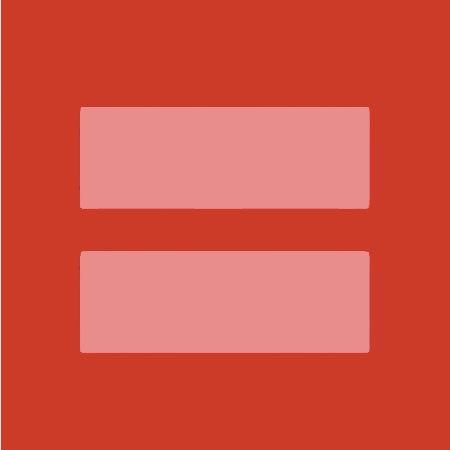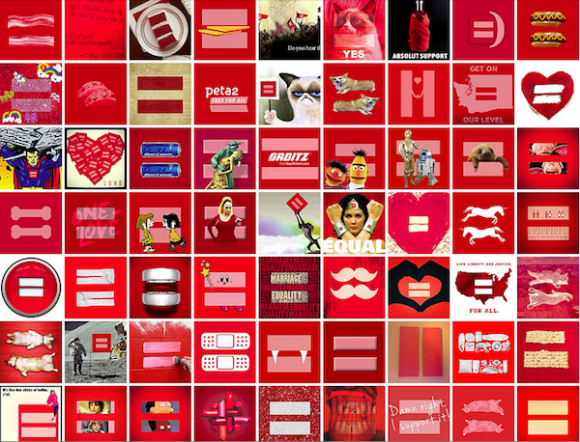aNewDomain.net — At 1 p.m. on Monday, Human Rights Campaign (HRC) — an advocacy group for LGBT individuals and their allies — posted a red-and-pink redesign of its logo on Facebook. In fewer than 24 hours, thousands of Facebook users had shared the image and made it their profile picture. Tweets under the hashtag #UnitedforMarriage started flooding in.
Celebrities, corporations, and countless other individuals have since endorsed the logo as a symbol of marriage equality. Far and away, the social world is taking a pretty major stand on this typically divisive issue. What does that say about the leanings of the social world at large versus the hard lines citizens generally fall along politically and geographically?
Image credit: Human Rights Campaign
HRC created the image to raise awareness about this week’s Supreme Court hearings, which will determine the fate of Proposition 8 and the Defense of Marriage Act (DOMA.) But unlike most viral phenomena, this does not appear to have been planned. HRC’s initial Facebook post garnered little attention until George Takei — of Star Trek fame — shared the image on his personal Facebook page. Pop star Ricky Martin soon followed suit, along with a number of prominent Democratic elected officials.
And they’re not alone. Other notable supporters include Beyonce, Ellen DeGeneres, Budweiser, HBO’s True Blood and Martha Stewart, which featured a layered devil’s cake on its homepage yesterday, (cut from the side, it resembled the equal sign in HRC’s logo.) Countless variations on the red-and-pink theme have been shared all over the web. Here’s a screenshot of HRC’s Favorite Logo Remixes on Flickr:
Image credit: Madison Andrews
So what does all this social buzz amount to in the end? In terms of directly affecting legislative change, perhaps not much. As Malcolm Gladwell noted on October 4, 2010 in Small Change: Why the Revolution Will Not Be Tweeted:
Facebook activism succeeds not by motivating people to make a real sacrifice but by motivating them to do the things that people do when they are not motivated enough to make a real sacrifice.
Most people who changed their Facebook photo may end their activist careers with that gesture. But as a whole, those little acts of solidarity add up to something powerful — especially for the people who have not only sacrificed, but suffered for their identity. In a Facebook post on Wednesday, NYC resident Roya Millard shared her gratitude:
…to see the people you know, not even the people who you’d necessarily say you ‘love’ but just the ones who make up your world…stand up and say ‘look, I’m going to just put this here. Just to show that I care. That I got your back. That I might not get what it’s like to have someone demonize me or wish me dead or treat me as less, but that doesn’t matter, because I’m here.’ That matters.
In the long run, the ability to connect and share ideas may matter even more than legislative victories. If history teaches us anything, it’s that laws are meaningless without the backing of individual hearts and minds. Social media, for all its faults, has one redeeming value — it can accelerate change in the collective consciousness of a nation. Whatever the outcome of these Supreme Court cases, it’s clear that something has shifted. People are no longer afraid to demonstrate their support for same-sex marriage — including an increasingly vocal cross-section of Congress.
Mother Jones published an article on Tuesday — Which Politicians Supported Gay Marriage and When?
The embedded timeline begins with future president Barack Obama, who in 1996 said that he favored “same-sex marriages, and would fight efforts to prohibit such marriages,” (a stance he later revoked and then reinstated.) Then there is a slow trickle of mostly progressive but increasingly bipartisan support, culminating in 2013. In the first quarter of this year alone, 13 former and current politicians publicly stated their support for same-sex marriage — including four Republicans and former Mitt Romney strategist Beth Myers.
These are people who, unlike Supreme Court Justices, make political decisions based on their constituent demographic. So this recent flood of same-sex support would seem to both reflect — as well as affect — the worldview of average Americans. As Jeffrey Toobin notes in this week’s New Yorker, “The question about marriage equality for all Americans is not if it will pass but when. The country has changed, and it’s never going back to the way it was.”















[…] Social Media Goes Red in Support of Marriage Equality by Joy Ma […]